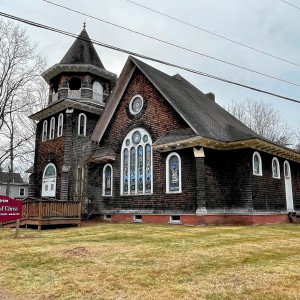BUSINESS QUARTERLY – Bill looks to increase accessory dwelling units
| Published: 04-23-2024 7:45 AM |
Housing in the state is not keeping up with current or future needs, according to analysts. According to the 2023 New Hampshire Statewide Housing Needs Assessment, the state is currently short by about 23,500 to meet today’s needs, and the problem is on a trajectory to get significantly worse, with an estimated shortage of 90,000 housing units by 2040.
In an effort to boost the available housing units in the state, the New Hampshire Legislature is considering a bill to increase the amount of accessory dwelling units allowed by right. The state defines an accessory dwelling unit (ADU) as a living unit located on a lot containing a single-family home, which provides independent living facilities and amenities for sleeping, eating, cooking and sanitation. They are sometimes referred to as “in-law apartments.”
House Bill 1291 would increase the amount of accessory dwelling units that must be permitted in any zoning district that allows residences from one to two. The bill passed in the House of Representatives in a 220-143 vote, and has been forwarded to the Senate, but has yet to come to a vote. A similar bill was introduced last year, but died in the Senate.
Under the current law, towns must allow ADUs, either by right, conditional use permit or special exception, in all zoning districts that allow single-family homes. Towns are only required to allow one ADU per lot, and can prohibit them on lots that already have multiple single-family homes, such as in the case of townhouses, or with manufactured housing.
The proposed change in the law would allow up to two ADUs, and eliminate the need for zoning processes such as conditional use permits or special exceptions, allowing them by right in all areas where single-family dwellings are allowed. It would also allow the first ADU to be either connected to the existing home or detached, though the town could require that at least one of the units be attached to the primary home.
The proposal would also increase the minimum size restriction towns might impose on possible ADUs. A town can establish minimum and maximum sizes for an accessory dwelling unit. However, while the size currently cannot be restricted to less than 750 square feet, it would be 1,000 square feet for the first ADU, or 850 square feet for the second.
Under the bill, towns must also allow existing buildings on properties to be converted to ADUs, such as detached garages, regardless of whether the structure violates current dimensional requirements for setbacks or lot coverage.
In another proposed change, the requirement that an interior door be provided between the principal home and an attached ADU would change to allowing either an independent entrance, or an entrance through a common space, but the municipality cannot limit the choice of ingress and egress. Towns could require up to one additional parking space for each bedroom associated with the ADU, either on-site or legally dedicated off-site, rather than the current, more-general requirement that the town may require adequate parking.
Article continues after...
Yesterday's Most Read Articles
 Frank Edelblut speaks at Dublin Education Advisory Committee forum
Frank Edelblut speaks at Dublin Education Advisory Committee forum
 Francestown Academy Coffeehouse is in its second year
Francestown Academy Coffeehouse is in its second year
 Petitioners seek special Town Meeting regarding tax lien on Antrim Church of Christ
Petitioners seek special Town Meeting regarding tax lien on Antrim Church of Christ
 UPDATE: Drivers identified in Jaffrey dump truck crash
UPDATE: Drivers identified in Jaffrey dump truck crash
 Alan Edelkind defends actions on proposed ConVal reconfiguration
Alan Edelkind defends actions on proposed ConVal reconfiguration
 Jaffrey Civic Center hosting ‘Two Tours’ exhibit
Jaffrey Civic Center hosting ‘Two Tours’ exhibit
Aesthetic standards would only be able to be applied if they are also applied to other single-family homes in the same area.
The law would also add clarification that an ADU may be constructed at the same time as the principal home, and add definitions for “attached” and “detached” units. Furthermore, it would change current language stating that if a municipality allows detached ADUs, it may require an increased lot size, but only up to one half-acre in order to have more than one ADU.
Some Mondanock region towns have already adopted similar language. New Ipswich this year adopted an ordinance that allows two ADUs, if at least one is attached to a home, and Temple already allowed up to two on certain large lots.
Christine Robidoux, the vice chair for the Temple Planning Board, said that addressing ADU codes has been part of the town’s ongoing discussion through a Housing Opportunity Program grant of how to make housing more accessible. Temple’s zoning code already allows the option for up to two ADUs. with some provisions. The town allows one attached ADU and one detached ADU if the lot has double the acreage required by the zoning district. Robidoux said the town has looked at removing that double-acreage requirement in the past.
“We are certainly tracking this bill as it works it's way through the process in Concord. The Temple Planning Board was already looking at our ADU zoning, and we are awaiting the feedback being gathered by our [Housing Opporunity Program] Grant Steering Committee through their one-on-one interviews,” Robidoux said. “Generally, there seems to be support for making some revisions to our ADU zoning. We've had several residents in town interested in building ADUs for family members who were unable to do so because of our current zoning.”
Opponents of the bill claim it takes power from towns.
“It’s not one-size-fits-all in this state,” said Rindge Planning Board Chair Roberta Oeser. “In small towns, to allow nearly every property to potentially be a three-family changes the whole nature and concept of single-family residential zones.”
Oeser, who is also a real estate agent, acknowledged the housing shortage exists, as prices of homes have skyrocketed to the point it is pricing out young people who grew up into those communities and there is a scant rental market. She said while the problem might be addressed through zoning, it should be done by town’s individual boards, who know the conditions and character of their towns.
“I think they’ve gotten their heads so buried in the housing shortage, they don’t think about what it’s doing to other property owners’ rights,” Oeser said of the bill.
The New Hampshire Municipal Association opposes the bill, writing in its weekly legislative bulletin that it is a statewide land-use mandate, which the association has historically opposed.
“We respect that some municipalities may wish to implement – or may have already implemented – local rules that mirror provisions in these bills, while others are taking different approaches that better suit their communities and reflect the input of their residents,” the bulletin reads. “This is a key reason why NHMA supports local decision-making on local issues, not statewide, one-size-fits-all, mandates.”
Ashley Saari can be reached at 603-924-7172, Ext. 244, or asaari@ledgertranscript.com. She's on X @AshleySaariMLT.

 Gail Hoar: Words About Wilton – Lessons while walking
Gail Hoar: Words About Wilton – Lessons while walking New photography studio opens on Jaffrey Main Street
New photography studio opens on Jaffrey Main Street State of the Schools – Budget challenges, but lots to celebrate at Mascenic
State of the Schools – Budget challenges, but lots to celebrate at Mascenic Jarvis Coffin: Off the Highway – Liver free or die
Jarvis Coffin: Off the Highway – Liver free or die
